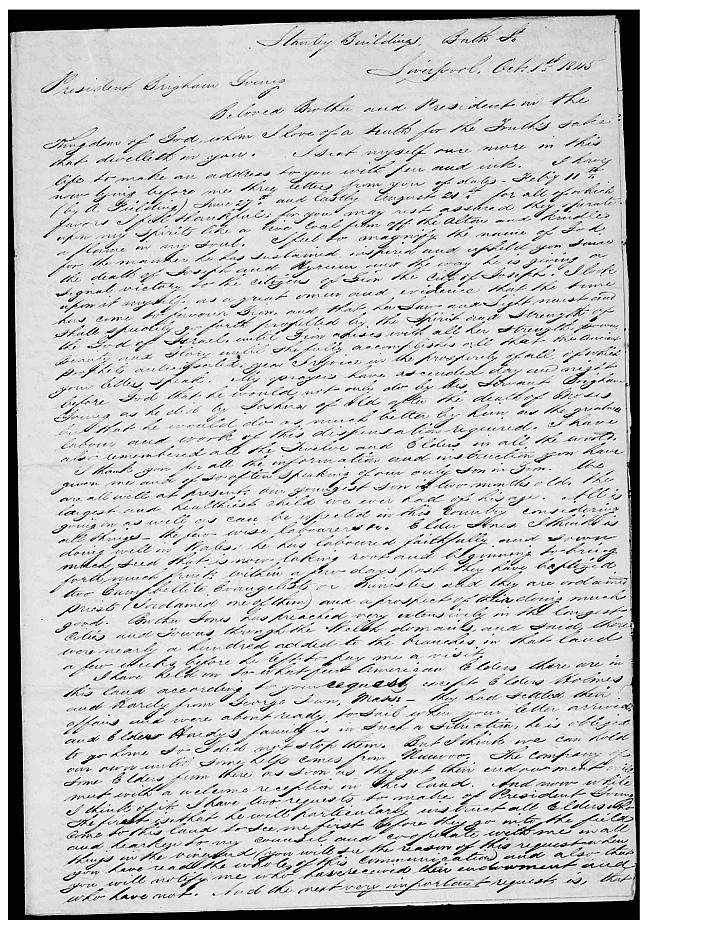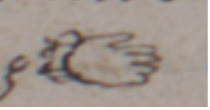
Day in the Life
Journal Entry
Related Documents
Browse other documents with this same date. These could include pages from Wilford Woodruff's autobiographies, daybooks, letters, histories, and personal papers. Click on the document titles to view the full document.

Discourse 1845-10-01
No. 8. . VOL. VI.
RATIONALITY OF THE ATONEMENT.
A Pamphlet has lately made its appearance in Glasgow, published by a member
of our church holding the office of priest, containing 28 pages, headed "A Treatise
on the Atonement, proving the necessity of Christ's Death for Man's Redemption
neither scriptural nor reasonable. By T. S. Barr."
We are sorry to be under the necessity of occupying our time and pages in noti-
cing a pamphlet bearing such an introduction, as the production of a member of the
Church of Christ; or that any man, bearing any portion of the authority of the
holy priesthood, should have his mind so much overcome by the powers of darkness,
as to stray so widely from the order and counsel of the kingdom of God, in pre-
senting for the investigation of the public a heresy so much opposed to the revela-
tions of God and every principle of holiness.
Our object in the present article will not be so much to refute the heretical doc-
trine advanced, as to introduce a portion of the testimony in favour of the principle
of redemption through the blood of Christ, with which the revelations of God so
much abound, in order that our views on the subject may be rightly understood by
all, and that the Saints of God may be prepared to withstand the assaults of the
grand enemy of man's salvation, as well as to set the matter for ever at rest in the
minds of those who believe in the revelations of God.
We had fully anticipated that our repeated cautions against individuals publish-
ing without our sanction, would have been sufficient, and saved us the trouble of
having to recur to the subject again. The neglect of adherence to this on the part
of the author, causes him to forfeit his authority and standing in the Church of God,
until, at least, he has repented of his error.
In our perusal of the pamphlet, we endeavoured to find out the object of the
author, and the only reasonable conclusion we could arrive at was, that it was a
strained attempt on his part at a display of talent and learning, from his being able
to make quotations from history, heathen mythology, and Hebrew. But it would
be far better for a man to be entirely divested of talents, than to use them in en-
deavouring to prove the inefficacy of the atonement of Christ, and striking at the
fundamental principle of salvation as he has done.
The author introduces himself to his readers by lamenting because of having "to
labour under great disadvantages while propounding what he conscientiously believes
to be a correct solution of this very important subject, as the views which he holds
are diametrically opposed to those entertained by Christians of almost all denomi-
nations; at least (he says) since the foundation of the Romish Church until now,
the belief has been tenaciously adhered to amongst professors of religion, that Jesus
Christ came into the world to suffer an ignominious death for, or instead of, Adam
and his posterity."
We would remark that he would have laboured under equal disadvantages, as
far as professors of the religion of heaven were concerned, had he lived cotemporary
with the Messiah himself and his apostles, or at any period, however remote, subse-
quent to that time; and that this doctrine was not one of the many false fabrications
or dogmas of men introduced to make void the designs of God, or lead the minds of
the people away "after seducing fables and doctrines of devils;" but that it was, not

Letter to Brigham Young, 1 October 1845
Liverpool
President Brigham Young
Beloved Broth & President
in the Kingdom of gGod whom I love of a truth for
the truth sake that dwelleth in you
I seat myself once
more in this life to make an address to you with
pen & ink I have now lying Before me three letters
from you of Dates Feb 11 by A Fielding June 27th
& lastly Aug 21st All of which I feel thankful for
all these favors for you may rest assured they operate
upon my spirits like a live coal from off the Altear
which kindle a flame in my soul I feel to magnify
^inspired & uphold^ the name of God for the manner he has sustained you
since the death of Joseph & Hyrum
& the way he is giving a signal victory
to the citizens of Zion the City of Joseph. I look upon
it myself as a great omin of & evidence that the
time had come to favor Zion & that her Land
& light must & will sped spedily go forth propelled
by the spirit & strength of the God of Israel untill
Zion arises will all her strength power beauty & glory
untill she fully accomplishes all that the Ancient
prophets anticipated yea I rejoice in the prosperity
of all of which your letters speak My prayers have
assended day & night before God that he would not

Letter to Brigham Young, 1 October 1845
Liverpool,
President Brigham Young
Beloved Brother and President in the
Kingdom of God, whom I love of a truth for the Truth's sake
that dwelleth in you. I seat myself once more in this
life to make an address to you with pen and ink. I have
now lying before me three letters from you of dates—Feb'y 11th
(by A. Fielding) June 27th and lastly August 21st for all of which
favors I feel thankful; for you may rest assured they operate
upon my spirit like a live coal from off the altar and kindles
a flame in my soul. I feel to magnify the name of God
for the manner he has sustained, inspired and upheld you since
the death of Joseph and Hyrum and the way he is giving a
signal victory to the citizens of Zion the city of Joseph. I look
upon it myself, as a great omen and evidence that the time
has come to favour Zion, and that her Sun and Light must and
shall speedily go forth propelled by the spirit and strength of
the God of Israel, until Zion arises with all her strength, power,
Beauty and Glory until she fully accomplishes all that the ancient
prophets anticipated; yea: I rejoice in the prosperity of all, of which
your letters speak. My prayers have ascended day and night
before God that he would not only do by His servant Brigham
Young as he did by Joshua of old after the death of Moses
but that he would do as much better by him as the greatness
labour and work of this dispensation required. [Joshua 1:1-9] I have
also remembered all the Twelve and Elders in all the world.
I thank you for all the information and instruction you have
given me and of so often speaking of our only son in Zion. We
are all well at present. Our youngest son is two months old, the
largest and healthiest child we ever had of his age. All is
going on as well as can be expected in this country considering
all thinges. the few wise labourers &c. Elder Jones I think is
doing well in Wales; he has laboured faithfully and sown
much seed that is now taking root and beginning to bring
forth much fruit; within a few days past they have baptized
two Campbellite Evangelists or ministers and they are ordained
priests (I ordained one of them) and a prospect of their doing much
good. Brother Jones has preached very extensively in the largest
cities and towns through the Welsh domains, and said, there
were nearly a hundred added to the branches in that land
a few weeks before he left to pay me a visit.
I have held on to what few American Elders there are in
this land according to your request except Elders Holmes
and Hardy from George Town, Masss—they had settled their
affairs and were about ready to sail when your letter arrived,
and Elder Hardy's family is in such a situation, he is obliged
to go home so I did not stop them. But I think we can hold
our own until some help comes from Nauvoo. The company of
some Elders from there as soon as they get their endowment will
meet with a welcome reception in this land. And now while
I think of it, I have two requests to make of President Young
The first is that he will particularly instruct all Elders who
come to this land to see me first before they go into the field
and hearken to my counsel and cooperate with me in all
things in the vineyard (you will see the reason of this request when
you have read the whole of this communcation) and also that
you will notify me who have received their endowment and
who have not. And the next very important request is, that
Events
View selected events in the two months surrounding this date in Wilford Woodruff's life. Click on the dates to jump to that day in Wilford Woodruff's journal.

Church Conference is held in the Nauvoo Temple; pulpits are complete and windows installed.

